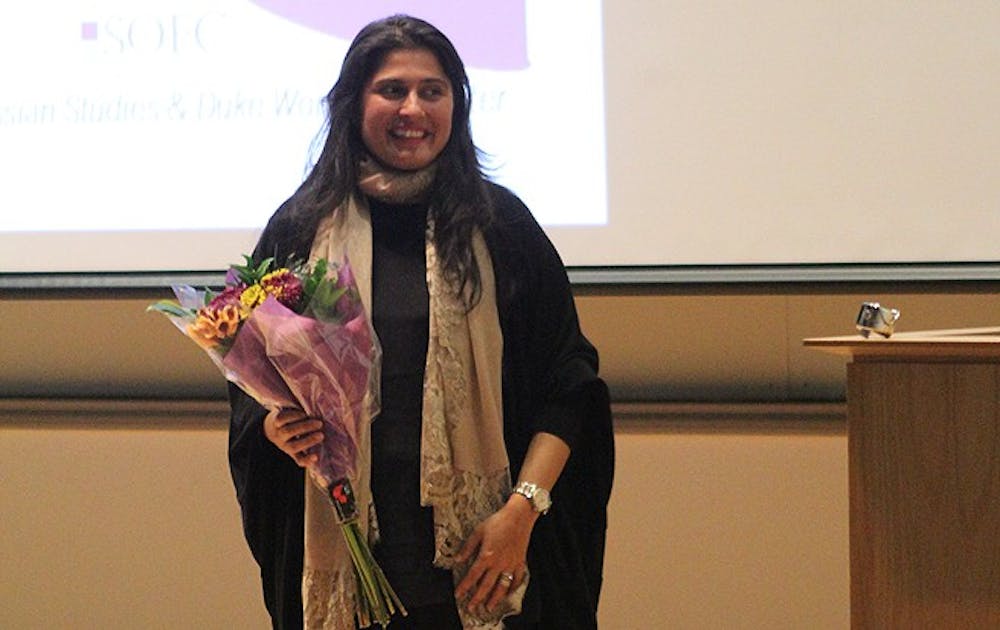Filmmaker Sharmeen Obaid-Chinoy won Pakistan’s first Oscar for her 2012 documentary Saving Face, which received the honor for Best Documentary-Short Subject. The film chronicled acid attacks on women in Pakistan. Chinoy’s films, focus on issues affecting women and children. Chinoy spoke to The Chronicle’s Kelly Scurry prior to a viewing of her upcoming film “Ho Yaqeen” Thursday, which was sponsored by the Pakistani Student Association.
The Chronicle: How would you describe your work?
Sharmeen Chinoy: I’m a social justice documentary filmmaker that focuses on human rights, gender inequality and minority rights. I’ve worked in over 10 countries and made six films. All of my films have been on stations in the United States, Britain, Canada, France and Germany. I did a lot of work on PBS Frontline, HBO, Discovery Channel and Channel 4 [in the United Kingdom].
TC: Why did you choose to focus on women’s and children’s issues?
SC: I’m partly driven to marginalized groups that don’t have voices. Women and children voices often get brushed aside, and I think there are issues we must discuss. If we never have the difficult conversations about these problems, we will never find the solutions.
TC: What led you into documentary filmmaking?
SC: I was a senior at Smith College when 9/11 happened, and I was writing for a variety of papers in the United States and Canada, and I noticed there were not many voices going into Afghanistan and Pakistan that knew little about the issue. In December 2001, I went to Pakistan and the first thing that struck me was the number of children that were Afghanis. Many parents had sent their children to Pakistan after the U.S. invasion in October. I felt the story about the impact of the war on the next generation of Afghans had not been told. I went back to the United States and wrote a proposal that I sent to 18 news organizations soliciting support. I got a lot of nos. Then I heard about the new president of New York Times Television, which had started a new venture online. Next thing I knew, The New York Times had hired me, and I was on my way to Pakistan.
TC: What about your life prepared you for your career?
SC: I was a person of two worlds—I was born in Pakistan but educated in the United States. It gave me a window into the developed and developing world that I could bring stories from one part of the world into the other
TC: How did your films attract an Academy Award and an Emmy?
SC: I think over the course of my career I won some big awards—the Alfred DuPont-Columbia Award and the Livingston Award for International Reporting. I felt my work has highlighted work that hasn’t been seen before and the fact that I bring views from a different part of the world, such as Children of the Taliban, that were brought to television for the first time [led to the awards].
TC: Have any of your films been shown in Pakistan?
SC: The films I have done recently have aired in Pakistan. The reason is that there isn’t a market for documentaries in Pakistan, and I make films around the world, not necessarily in Pakistan.
TC: How has your work been received in Pakistan?
SC: It’s been fairly positive because it was Pakistan’s first Academy Award. Of course there were some right-wing voices that said I should focus on other countries with similar issues rather than Pakistan. Whenever you have a conversation about difficult issues there will always be voices that say no. It has given me a platform to bring issues to Pakistan in films for the first time. After winning the Academy Award, I partnered with Coca-Cola to make six shows about pressing problems in Pakistan for television audiences. Coca-Cola bought airtime on sixteen channels.
TC: What is your mission?
SC: I think my mission is to bring awareness, make people uncomfortable to know they live in a world with these issues and to start conversations because people will know how to solve those issues.
TC: Do you think U.S. viewers have learned about Afghanistan and Pakistan through your films?
SC: I think it’s fairly successful because my work has gained prominence and I have been fortunate to see my shows on primetime and after airing I have received emails and questions that show people are listening.
TC: Have you begun thinking about future projects yet?
SC: I am doing several projects. One is about people around the world who gave up violence and what prompted them to do that and how they convince others to do the same. It’ll take another year and a half to complete it.
TC: What do you want to see as your legacy?
SC: I think I really would like people to look back and say I provided daylight about issues affecting the [Middle East] today.
TC: Do you have any advice for aspiring filmmakers?
SC: It’s so easy today in the digital world to make a film. You don’t even need a distributor because you have YouTube. Many young people worry that they don’t have the funding to make a film. All you need is a point and shoot camera and a good story.
Get The Chronicle straight to your inbox
Signup for our weekly newsletter. Cancel at any time.

